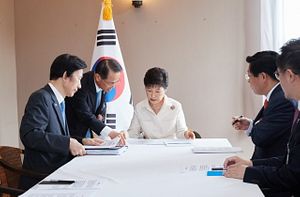North Korea conducted its fifth underground nuclear test on September 9 in flagrant defiance of United Nations Security Council (UNSC) resolutions. Estimates of the explosive yield of the latest blast have varied. South Korea’s Defense Ministry and Meteorological Administration estimated the earthquake following the latest nuclear test at a magnitude of 5.0, meaning an explosive yield of 10 to 12 kilotons, while international seismological observatories registered the tremor at magnitude 5.3. Based on this, some South Korean experts suggested a yield of 20 kilotons or stronger.
Whatever the exact numbers may be, the bottom line is that it was Pyongyang’s strongest-ever nuclear test. The North has continued to flaunt its nuclear ambitions with a series of tests, and the latest test shows it is only a matter of time before the rogue nation field-deploys its nuclear arsenal. To be blunt, the UNSCR is not a reliable means of deterrence — it has never been, and it will never be. Against this backdrop, President Park Geun-hye of South Korea instructed the country’s military to maintain a full readiness posture to strongly retaliate against any type of North Korean nuclear provocation.
North Korea is banned by the UN from any tests of nuclear or missile technology and has been hit by six sets of UN sanctions so far; however, the sanctions have failed to denuclearize the North. The UN’s efforts have been ineffective mainly because of resistance from China and Russia. Beijing, while nominally joining the UNSC’s sanctions, has enabled Pyongyang to stay afloat, and Moscow has been on the same page. In other words, the North has been empowered by two of the permanent five members of in the UNSC to maintain its nuclear weapon program. Pyongyang knows fatal sanctions — including military ones — will never be decided by the UNSC.
For example, UNSC Resolution 2270, adopted in response to the North’s fourth nuclear test in January, bans mineral exports from the regime, but with an exemption for exports meant to provide for the livelihood of North Korean people. China has exploited this loophole and continued fueling and trading with the isolated communist regime. Such Beijing-Pyongyang strategic collusion amply illustrates Beijing’s recognition that the North’s nuclear bombs are their strategic assets to check the United States and its allies in Northeast Asia.
While fanning the flames of Pyongyang’s nuclear provocations, Beijing has strongly protested against Seoul’s recent decision to deploy the Terminal High Altitude Area Defense (THAAD) system and suggested that the THAAD deployment was as provocative as the North Korean tests. Some of Beijing’s official news agencies even contended that the deployment of the anti-missile defense system triggered Pyongyang’s fifth nuclear test, infuriating South Koreans.
Amid the North’s second nuclear test this year, calls for a dramatic shift in the national security landscape have been made in Seoul. Some have asked for the reinstatement of the U.S. tactical nuclear weapons or for South Korea to develop its own nuclear armament while others criticize the UNSC for its incompetence. Academics have argued that the South should partner with Taiwan and Japan on nuclear weapons development in response to the strategic collusion of China, Russia, and the North, and regime change is increasingly perceived to be the only way to denuclearize the North. Some politicians have demanded a “trigger system” under which South Korea would advance its own nuclear weapon program in accordance with the North’s nuclear weapon advancement. Earlier, on August 24, some members of the national assembly belonging to the ruling Saenuri Party had called for the government to respond to the increasing threat posed by Pyongyang’s SLBMs by developing nuclear-powered submarines.
In this vein, the South’s defense minister, Han Min-koo reported to the National Assembly on September 13 at a “nuclear forum” that the Ministry is now in the process of building the “Korean Massive Punishment and Retaliation” (KMPR) system, complementing the current preemptive and defense strategies. According to the Ministry, the KMPR is aimed at launching attacks on North Korean leadership if signs of their impending use of nuclear weapons are detected. South Korean media have reported that Seoul’s Defense Ministry, for the purpose of deterring the North’s use of nuclear weapons, is currently seeking conventional weapons of mass destruction strong enough to erase the city of Pyongyang from the map and bunker busters powerful enough to effectively destroy the North’s underground military facilities. They also reported that the military is working on a special decapitation operation unit whose main task is to destroy the North’s leadership.
North Korea, as President Park said, has spun out of control in recent years. The regime has recklessly instilled fear not only among its own people, through a string of executions and human rights abuses, but among the people of neighboring countries, thus prompting an unproductive inter-Korean arms race and dampening peace and security in Northeast Asia. Really, the international community needs to come up with different approaches to prevent Pyongyang from going bad to worse. Above all, the two nations now conniving at the North’s nuclear adventurism, China and Russia, need to initiate new substantial and credible measures to put an end to the North’s nuclear obsession.
Kim Tae-woo is Professor at Konyang University and Former President of the Korea Institute for National Unification

































